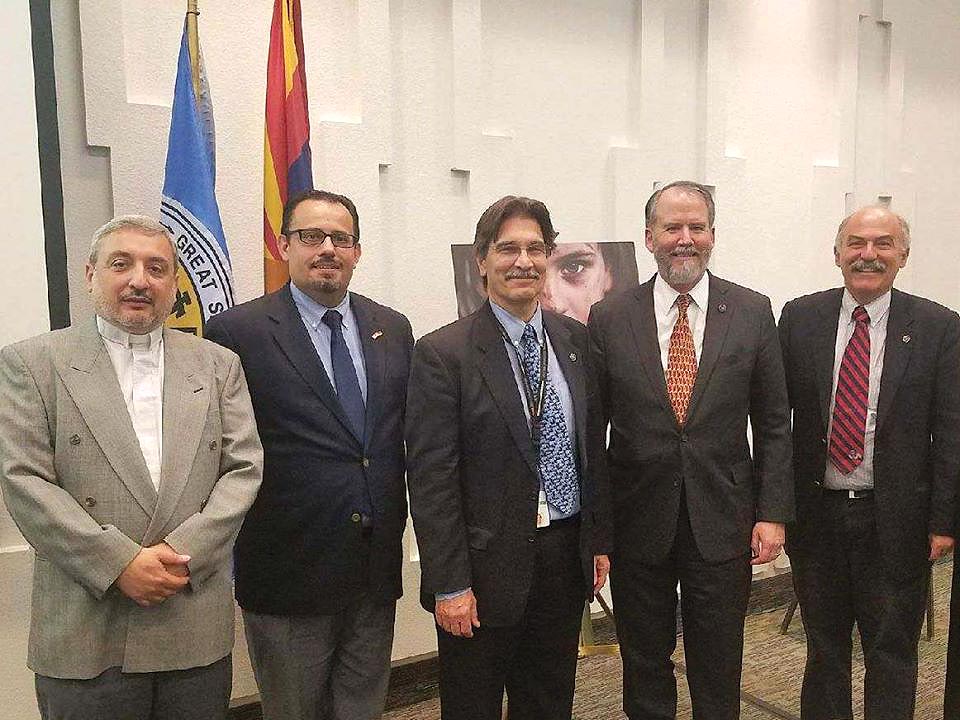
Photo: ASP Archive
Staff Report
Former U.S. Ambassador to Armenia John M. Evans was the keynote speaker opening the 6th Annual “Genocide Awareness Week” held at Scottsdale Community College, in Scottsdale, Arizona, April 9-14. Armenian Studies Program Coordinator Prof. Barlow Der Mugrdechian was also a guest speaker at the conference, speaking on “The Armenian Genocide Today,” on Tuesday, April 10, to students, faculty, and Scottsdale community members.
In past years “Genocide Awareness Week” has included presentations on the Armenian Genocide by Dr. Richard Hovannisian, Dr. Sergio La Porta, Dr. Ümit Kurt, and Dr. Khatchig Mouradian.
Organized by Prof. John Liffiton, Scottsdale Community College’s “Genocide Awareness Week” has become the largest such event on a college campus in the United States. This years’s conference featured presentations on American Indians, the Holocaust, the Assyrian Seyfo, and Rwanda.
St. Apkar Armenian Apostolic Church of Scottsdale has been a generous supporter of the “Genocide Awareness Week” activities and annually sponsors speakers on the Armenian Genocide. Fr. Zacharia Saribekyan, pastor of St. Apkar, has played a key role in the continuing inclusion of the Armenian Genocide in the “Genocide Awareness Week.” This year the Armenian Assembly of America also became a key sponsor of the event and their Western Regional Director Mihran Toumajan attended the conference.
Ambassador Evans is the author of “Truth Held Hostage: America and the Armenian Genocide. What Then? What Now?” (Gomidas Institute, 2016), a detailed look into his experience while Ambassador in Armenia. A veteran of the United State Foreign Service, Ambassador Evans had no Armenian ancestors or family connections. However, over the course of his historical studies and diplomatic career, he became convinced that a gross injustice was being perpetrated against the Armenians through the denialist policies of the Turkish Government and the United State Government’s tacit acceptance of them.
Ambassador Evans served as United States Ambassador to the Republic of Armenia from August of 2004 until 2006. In February 2005 he made a trip to California and at several different meetings with Armenian-American groups, when asked about Washington’s lack of official recognition of the 1915-23 Armenian Genocide as a “genocide,” Evans replied: “I will today call it the Armenian Genocide.” He thus publicly broke with the U.S. government’s policy of non-recognition of the 1915 Armenian Genocide and was recalled from his post by President Bush.
The pastor and Parish Council of St. Apkar Armenian Apostolic Church organized a special reception for Ambassador Evans on Tuesday, April 11, at the Melikian Hall of the Church. Earlier in the day, the local Barnes & Noble book-store hosted a book talk and signing by Ambassador Evans. Armenian Assembly Executive Director Bryan Ardouny attended the evening reception.
Der Mugrdechian’s lecture on “The Armenian Genocide Today,” focused on three aspects of the Genocide: memoirs and oral history, the Armenian Genocide in Armenian-American literature, and memorials and monuments to the Genocide. The overall theme of the presentation was on the cultural impact of the Genocide and the Armenian response to it.
The first phase of the post-Genocide diaspora was the collection of oral histories on the Genocide. Beginning in the 1970s and 1980s multiple Armenian organizations embarked on Oral History projects to document the experiences of survivors. By doing so, they preserved a story which otherwise may have been lost.
A second phase of the post-Genocide period was when Armenian-American writers began to include references to the Genocide in their works. Authors such as William Saroyan and Peter Najarian explored how the Genocide became a central focus of the Diasporan experience in the making of identity.
Hundreds of memorials and monuments have been constructed throughout the Diaspora to not only affirm the Genocide, but to educate future generations. These monuments have become the focus for April 24 commemorations through the world.
Armenian Genocide memorials at Fresno State and at Scottsdale Community College were given as significant examples of this phenomenon.
The seventh annual “Genocide Awareness Week,” is already in the planning stages and will be held the week of April 15, 2019.
 Hye Sharzhoom Armenian Action
Hye Sharzhoom Armenian Action